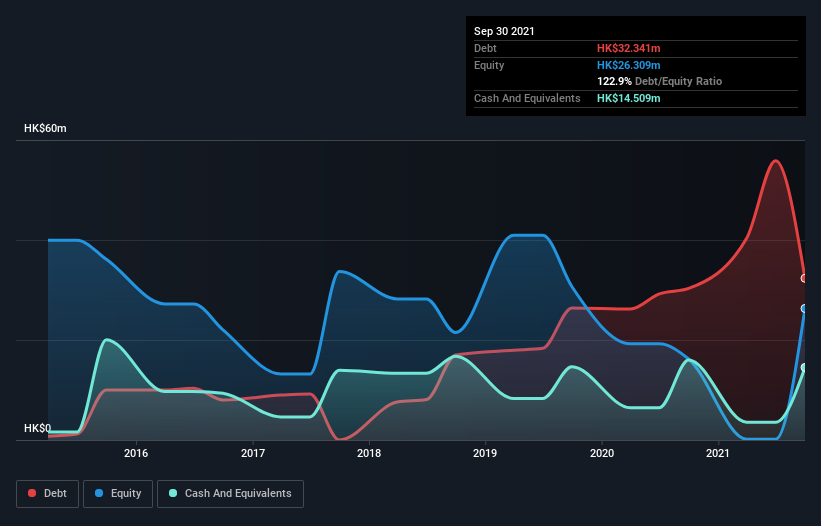- Hong Kong
- /
- Electronic Equipment and Components
- /
- SEHK:8218
Here's Why Echo International Holdings Group (HKG:8218) Can Afford Some Debt
Legendary fund manager Li Lu (who Charlie Munger backed) once said, 'The biggest investment risk is not the volatility of prices, but whether you will suffer a permanent loss of capital.' When we think about how risky a company is, we always like to look at its use of debt, since debt overload can lead to ruin. We can see that Echo International Holdings Group Limited (HKG:8218) does use debt in its business. But should shareholders be worried about its use of debt?
When Is Debt A Problem?
Debt assists a business until the business has trouble paying it off, either with new capital or with free cash flow. In the worst case scenario, a company can go bankrupt if it cannot pay its creditors. However, a more usual (but still expensive) situation is where a company must dilute shareholders at a cheap share price simply to get debt under control. Of course, plenty of companies use debt to fund growth, without any negative consequences. When we think about a company's use of debt, we first look at cash and debt together.
Check out our latest analysis for Echo International Holdings Group
How Much Debt Does Echo International Holdings Group Carry?
You can click the graphic below for the historical numbers, but it shows that as of September 2021 Echo International Holdings Group had HK$32.3m of debt, an increase on HK$30.3m, over one year. However, it does have HK$14.5m in cash offsetting this, leading to net debt of about HK$17.8m.

A Look At Echo International Holdings Group's Liabilities
We can see from the most recent balance sheet that Echo International Holdings Group had liabilities of HK$16.8m falling due within a year, and liabilities of HK$39.2m due beyond that. Offsetting this, it had HK$14.5m in cash and HK$5.75m in receivables that were due within 12 months. So its liabilities outweigh the sum of its cash and (near-term) receivables by HK$35.8m.
This deficit is considerable relative to its market capitalization of HK$45.0m, so it does suggest shareholders should keep an eye on Echo International Holdings Group's use of debt. This suggests shareholders would be heavily diluted if the company needed to shore up its balance sheet in a hurry. The balance sheet is clearly the area to focus on when you are analysing debt. But you can't view debt in total isolation; since Echo International Holdings Group will need earnings to service that debt. So if you're keen to discover more about its earnings, it might be worth checking out this graph of its long term earnings trend.
In the last year Echo International Holdings Group wasn't profitable at an EBIT level, but managed to grow its revenue by 36%, to HK$64m. Shareholders probably have their fingers crossed that it can grow its way to profits.
Caveat Emptor
Despite the top line growth, Echo International Holdings Group still had an earnings before interest and tax (EBIT) loss over the last year. Its EBIT loss was a whopping HK$20m. When we look at that and recall the liabilities on its balance sheet, relative to cash, it seems unwise to us for the company to have any debt. So we think its balance sheet is a little strained, though not beyond repair. However, it doesn't help that it burned through HK$10m of cash over the last year. So in short it's a really risky stock. There's no doubt that we learn most about debt from the balance sheet. However, not all investment risk resides within the balance sheet - far from it. We've identified 3 warning signs with Echo International Holdings Group , and understanding them should be part of your investment process.
When all is said and done, sometimes its easier to focus on companies that don't even need debt. Readers can access a list of growth stocks with zero net debt 100% free, right now.
Valuation is complex, but we're here to simplify it.
Discover if Echo International Holdings Group might be undervalued or overvalued with our detailed analysis, featuring fair value estimates, potential risks, dividends, insider trades, and its financial condition.
Access Free AnalysisHave feedback on this article? Concerned about the content? Get in touch with us directly. Alternatively, email editorial-team (at) simplywallst.com.
This article by Simply Wall St is general in nature. We provide commentary based on historical data and analyst forecasts only using an unbiased methodology and our articles are not intended to be financial advice. It does not constitute a recommendation to buy or sell any stock, and does not take account of your objectives, or your financial situation. We aim to bring you long-term focused analysis driven by fundamental data. Note that our analysis may not factor in the latest price-sensitive company announcements or qualitative material. Simply Wall St has no position in any stocks mentioned.
About SEHK:8218
Echo International Holdings Group
An investment holding company, manufactures and trades electronic products and accessories in Hong Kong, rest of Asia, Europe, Australia, North America, South America, and internationally.
Flawless balance sheet with very low risk.
Market Insights
Weekly Picks


Crazy Undervalued 42 Baggers Silver Play (Active & Running Mine)


Fiducian: Compliance Clouds or Value Opportunity?

Willamette Valley Vineyards (WVVI): Not-So-Great Value
Recently Updated Narratives

Watch Pulse Seismic Outperform with 13.6% Revenue Growth in the Coming Years

Significantly undervalued gold explorer in Timmins, finally getting traction

Moderation and Stabilisation: HOLD: Fair Price based on a 4-year Cycle is $12.08
Popular Narratives


MicroVision will explode future revenue by 380.37% with a vision towards success


NVDA: Expanding AI Demand Will Drive Major Data Center Investments Through 2026





